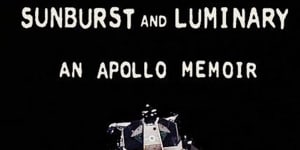Book Talk with Don Eyles
Saturday, Aug 20, 2022 6:00p -
8:00p
Where:
FPAC Gallery 300 Summer Street
300 Summer St
Boston, MA 02210
Admission:
FREE
Categories:
Date Idea, Lectures & Conferences
Event website:
https://www.eventbrite.com/e/fpac-book-talk-series-featuring-don-eyles-tickets-328329250627?aff=ebdssbdestsearch
FPAC is proud to host its second book talk of 2022 with artist, author, and retired NASA computer engineer Don Eyles!
The Event
The Fort Point Arts Community would like to invite you to our second book talk of the 2022 season with author, artist, and retired NASA computer engineer Don Eyles as he shares with us his insights in his book Sunburst and Luminary: An Apollo Memoir. Please join us on what is expected to be a memorable evening followed by a chance to meet the author during a book signing at the end.
The Book
A New Perspective on the Space Program in the 1960s
Fresh out of college, the author goes to work for the MIT laboratory that designed the Apollo guidance system. His assignment is to program the complex lunar landing phase in the Lunar Module's onboard computer. As he masters his art the reader learns about the computer, the mission, and a bit about spacecraft navigation and meets a cast of interesting characters along the way.
As Apollo 11 approaches, the author flies lunar landings in simulators and meets the astronauts who will fly the LM for real. He explains the computer alarms that almost prevented Neil Armstrong from landing and describes a narrow escape from another dangerous problem. He helps Pete Conrad achieve a pinpoint landing on Apollo 12, and works with Apollo 16 commander John Young on a technique for landing even more precisely. On Apollo 14 he devises a workaround when a faulty pushbutton threatens Alan Shepard's mission, earning a NASA award, a story in Rolling Stone, and a few lines in the history books.
Along the way the author hits the high points of his eclectic personal life, as he enters adulthood in the 1960s. He writes for students of the Apollo project, for whom the development of the flight software is still largely unexplored territory, but also for the young coders of the current digital culture, who will get the author's observations on the art of programming and who may identify as he explores sex, drugs, and the other excitements of the era. The underlying thesis is that the American space program in the 1960s was successful not in spite of, but in large measure because of the idealism, the freedom of thought, and the sense of exploration, inner and outer, that prevailed in the culture during that period.
The memoir concludes in a party atmosphere at the spectacular night launch of Apollo 17 before a glittery crowd an occasion that marked the high water mark, so far, of human space exploration.
Foreward by Apollo 15 commander Dave Scott.
About the Author
Don Eyles worked on the Apollo project from 1966 to 1972, and on the NASA space program until 1998, as a computer scientist at the MIT Instrumentation Lab and the Charles Stark Draper Laboratory in Cambridge, Massachusetts.
He created programs for the computer of the Apollo Lunar Module, responsible for the software that successfully guided the LM during the critical lunar landing phases of every Apollo mission that was able to attempt a landing. He worked with astronauts and NASA flight controllers to improve the software in response to the operational goals for each mission, and he received the NASA Public Service Award in 1971 for devising a timely workaround for a problem that jeopardized Alan Shepard's mission to the Moon.
After Apollo he helped develop several simulations of the Space Shuttle, and led the development of a Space Station simulation that explored the use of computer graphics aboard a manned spacecraft. For simulation purposes he developed a sequencing system called Timeliner, built around a language based on temporal constructs such as "when," "before" and "until." After further development Timeliner was chosen by NASA for use as the "user interface language" aboard the International Space Station, where it is in continuous operation.
Eyles is the author, besides technical papers, of stories and opinion pieces in the New York Times, the Boston Globe, and other publications. He regularly lectures about the Apollo project for a course given at MIT. His book, titled "Sunburst and Luminary: an Apollo Memoir," will be released by Fort Point Press on March 1, 2018.
Since 1985 he has regularly exhibited his photographs, which include a long-term investigation of the Boston's Big Dig project. Since 1998 he has created a series of floating sculptures, based on the Platonic solids, principally appearing in the Fort Point Channel of Boston, of which the latest is currently on view. His personal web site is doneyles.com.









